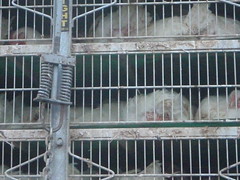 Continuing
Gov. Deal: the good, the ugly, and the bad on prisons,
quoting again from
David Rodock’s interview with Gov. Nathan Deal
in today’s VDT.
Continuing
Gov. Deal: the good, the ugly, and the bad on prisons,
quoting again from
David Rodock’s interview with Gov. Nathan Deal
in today’s VDT.
The Bad
Remember Gov. Deal mentioned poultry operators as an illustration of his bogus point that government intervention is always bad? Well, I guess he forgot that when he answered this question:THE TIMES: Your proposal to have probationers replace illegal immigrants for farm labor. Did that idea work? If it didn’t or it did, what’s going to happen next year during the picking season?Really? Except for little things like not being able to vote if they are felons, and having to pay their probation officers. But back to the Gov.:DEAL: “Well, it worked with some success. I think there was a great deal of skepticism about it on whether these people will work and there is a threat associated with their presence. We have to remember that probationers are not under arrest. They are free in our society.
They do have a mandate as a part of their conditions of probation or parole that they have a job. I think the untold story is that we not only have those probationers working in a variety of different things around our state, we actually have prisoners working in private industry in our state. We have at least one major poultry manufacturer that uses prison labor and they are brought in.What? I thought Gov. Deal was against government intervention in the poultry industry? Yet he’s for the government supplying prisoners as labor. Prisoners who compete with free labor.
They are supervised, and I think that is a model we need to look at. First of all, these are individuals who want to work and they get to keep a small portion of the salary that they earn.How small? Typically about a dollar a day, or maybe five dollars.
And where does the rest of what prisoners are paid go?
 Well, if the prisoners come from a state public prison,
like the ones the Lowndes County Commission just contracted for,
presumably the rest of the prison detail cost to the Commission goes
to the state.
Well, if the prisoners come from a state public prison,
like the ones the Lowndes County Commission just contracted for,
presumably the rest of the prison detail cost to the Commission goes
to the state.
But if the prisoners come from a private prison, such as the one CCA and the Valdosta-Lowndes County Industrial Authority want to build in Lowndes County, the rest goes to CCA, a private corporation. Your tax dollars profiting a private corporation for slave labor.
Gov. Deal continued:
They are allowed to earn money that then they can pay restitution for theDiscreetly, eh? Too bad for the Gov. the VDT was indiscreet enough to ask about it….crimes they may have committed, pay child support because most of them do have children that they are obligated to support and then, a small portion of it, they get to keep when they get out. Plus they’re learning a skill. I think that if we handle it discreetly and educate everybody as to what the possibilities are, then we may have some real opportunities. I am talking with the Department of Corrections and we’re going to try and get some of those stories told so people feel a little more comfortable about those possibilities.”
 I don’t know about you, but I don’t feel comfortable about prison slave labor
competing with free labor.
Especially when the state continues on its path of privatization of its
prisons, with CCA featuring Georgia as
a model partner.
Hiring out prisoners from a private prison gives the private prison company
incentive to lock up more people for more profit, while competing
with free labor.
Does that seem right to you?
I don’t know about you, but I don’t feel comfortable about prison slave labor
competing with free labor.
Especially when the state continues on its path of privatization of its
prisons, with CCA featuring Georgia as
a model partner.
Hiring out prisoners from a private prison gives the private prison company
incentive to lock up more people for more profit, while competing
with free labor.
Does that seem right to you?
The VDT’s very next question was the one about decreasing the prison population. The Gov. apparently sees no contradiction in providing incentive to increase the prison population at the same time as he claims to want to decrease it.
We don’t need a private prison in Lowndes County, Georgia. Spend that tax money on rehabilitation and education instead.
-jsq
Short Link:
http://www.ajc.com/news/georgia-prison-population-costs-429757.html
“Georgia operates the fifth-largest prison system in the nation, at a cost of $1 billion a year. The job of overseeing 60,000 inmates and 150,000 felons on probation consumes 1 of every 17 state dollars.”
Maybe if our tax dollars were spent on education and rehabilitation we wouldn’t have so many folks locked up in the first place!